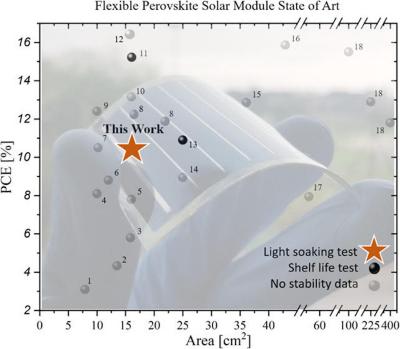Researchers at the University of Rome Tor Vergata's Centre for Hybrid and Organic Solar Energy (CHOSE), in collaboration with Poland-based Saule Technologies, have demonstrated a large-area flexible perovskite solar module with a fully scalable deposition technique.

The results show the optimization of PTTA and perovskite layer deposition by blade-coating, with the final fabrication of a flexible perovskite module with a PCE of 10.51% over 15.7 cm2, showing outstanding light stability of FPSM with a T80â² of 730 h and a recovery efficiency in the dark showing a T80â³ of 1560 h, the most stable in the literature reported so far.
The researchers believe that a light/dark cycle test, such as ISOS-LC standards, could be integrated to understand and study the recovery process of the devices under dark conditions, simulating the night and day shifts.

